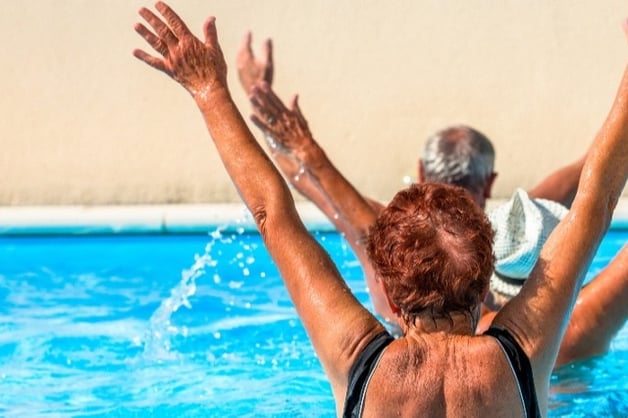
Staying active is key to both physical and mental health. A wonderful way to keep your body moving is through aqua therapy.
Water provides resistance, which is a great workout for your heart. When you walk or run in water, your heart has to work harder to pump blood through your body. Additionally, when you are in the water, your weight is displaced making you more buoyant. This means that doing exercise in the water allows you to get a cardio workout without putting any impact on your joints.
Outside of the physical benefits, aqua therapy is also very calming. The sound of water and the feeling of being surrounded by it can help to ease anxiety and promote relaxation. Taking part in these activities with friends can make a dip in the pool a great social activity–another key to strong mental health.
The physical benefits of swimming or exercising in water are well documented. Aqua therapy is an effective way to increase your range of motion, build muscle strength and endurance, improve your cardiovascular fitness, and improve your balance. You can get basically the same workout as an aerobics class without the stress on your ankles, knees, hips, or arms simply by doing it in the water.
Water as Recovery Therapy
For people who are recovering from an injury or surgery, aqua therapy can be incredibly beneficial. The natural buoyancy of water helps to support your body weight and takes the pressure off of your joints as they heal. This can help you to regain range of motion and ease back into your regular workout routine.
Aqua therapy is also often recommended for people who are living with arthritis or other chronic pain conditions. Plus, because your body does not need as long to recover due to the less intensive nature of being in water, aqua therapy is something you can do much more often than other forms of exercise.
Practice Safe Swimming
As with any form of exercise, there are some safety precautions to consider. If a person is not a strong swimmer or all that comfortable in water to begin with, it's best to keep a flotation device handy. Things like pool noodles or kickboards offer extra buoyancy and can even be incorporated into a workout routine.
Another safety issue related to pools, particularly outdoor ones, is skin care. It's important to wear waterproof sunscreen or a sun shirt if you're going to be out in the sun while you're in the pool. It's also important to take care of your skin after being in chlorinated water. Be sure to shower and use a good moisturizer to keep your skin from drying out.
Calorie expenditure is high when doing activities in the water. Be sure to hydrate and fuel your body with a nutritious snack or meal afterward.
It's Never too Late to Start
Senior living communities, such as some managed by The Goodman Group, do offer pools as an amenity as well as instructor lead classes. You or your loved one can also sign up for aqua classes through your local YMCA or athletic club. Be it through a senior living community, athletic club, or backyard pool, participating in water-related exercise is a great way to remain active through all stages of life.

